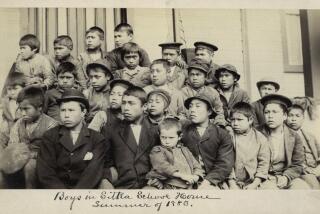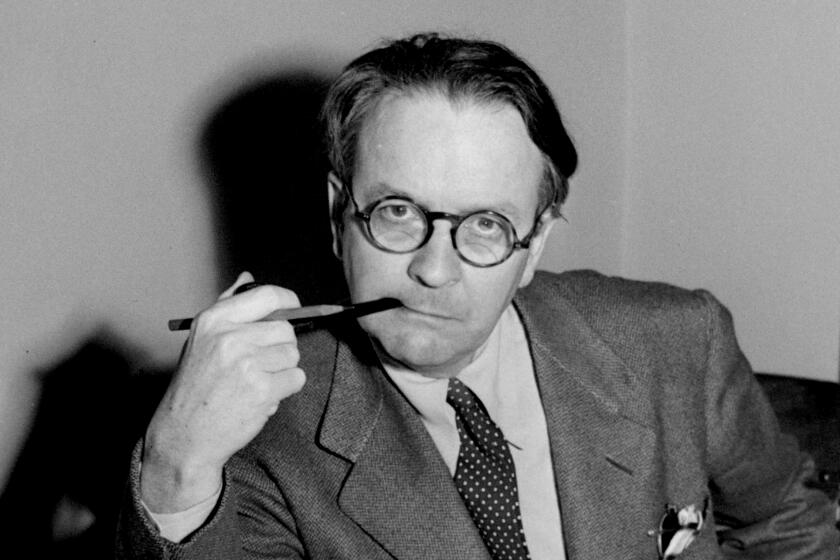The boarding school novel’s #MeToo reckoning
- Share via
The boarding school novel is like a locked-room mystery that, rather than solving a murder, purports to discover exactly how a teenager’s self-worth is being wrecked. Just imagine all those miniature feuds that characterized your high school experience and now imprison the players in whispery chapels, oak-clad dining halls and drafty bedrooms for 24 hours a day.
The originators of the genre, like John Knowles’ “A Separate Peace” (1959) and Joan Lindsay’s cult classic “Picnic at Hanging Rock” (1967), were about the loss of innocence, the lurch from sheltered child to jaded young adult. More recent standouts, like Tobias Wolff’s “Old School” and Curtis Sittenfeld’s “Prep,” have largely focused on class and the battle to fit in when one’s classmates are minor royalty or the sons of Wall Streeters.
Fifteen years later, the post-Weinstein reckoning has spawned a new breed of boarding school novels — tales of sexual original sin and play-by-play accounts of humiliation, abuse and degradation wrought largely on young women’s bodies. Books from Susan Choi, Kate Walbert and others have attacked the issue directly, like antibodies responding to a newly discovered contagion. But “My Dark Vanessa,” the exquisite, often nauseating new debut novel by Kate Elizabeth Russell, isn’t just fighting the infection; it’s tracing the pathogen back to its source, tracing its spread from unsuspecting woman to unsuspecting woman.
Vanessa Wye explains her teenage self only in relation to Jacob Strane, the 42-year-old teacher who seduces her when she’s 15, chaining her life forever after to this one relationship. Her hair, we know, is “maple leaf” red, because that’s what Strane compares it to; she says she’s a “loner” because he describes himself that way. Who is Vanessa, really, but a figurine cast in a mold that Strane pressed her into? As a teenager, she accepted his warped promises as gospel — “He was careful with me. He tried so hard to be good” — but more than a dozen years later, when another former student accuses Strane of abuse, she wonders whether an independent Vanessa can even exist.
There aren’t “right” words to describe Vanessa and Strane’s relationship as it evolves from a flirtation on the campus of Browick, the Maine boarding school where he teaches literature, to their first sexual encounter in his bed, when she awakes to find him on top of her, stealing her virginity, and onto the protracted cat-and-mouse game that dogs her young adulthood. Readers can clearly see that Strane is a predator, grooming Vanessa with descriptions of his ache for her, calling himself “pathetically in love,” passing her a copy of “Lolita” and proclaiming his ethical agonies. But Vanessa for the most part sees it as love, as dating, as a relationship.
And yet, it’s more complicated than that. She tells one man that Strane raped her, but shouts, “He didn’t abuse me!” to a boyfriend as well as a #MeToo whistle-blower. Which is why it feels out of step with the novel to choose one description over another: She was raped, and maybe she was also loved; she had no power, and she also used her beauty to get her way; she suffered, and she persisted.
Russell says she’s been working on the novel for nearly 20 years, since she was about 14. She too attended a Maine boarding school but has chosen not to share any stories of her time there. (She shouldn’t have to.) Instead, “My Dark Vanessa” stands on its own as simultaneously specific and universal — about a young woman who believes she’s in a love story when she’s actually in a psychological horror film. There was a brief dust-up when memoirist Wendy Ortiz implied, without reading “My Dark Vanessa,” that Russell borrowed some of her life experiences for the novel. The defense here is both obvious and depressing: The idea of the young girl preyed upon by a malignant man is so universal as to flirt with cliché.
Boarding schools are just the sorts of institutions where predators like Strane can feel at home. In April 2017, Choate Rosemary Hall in Wallingford, Conn., released a report detailing allegations of abuse by 12 faculty members, including an English teacher who allegedly gave a student herpes in the 1980s. A month later, St. Paul’s, a tony prep school in Concord, N.H., put out its own report. According to that report, 13 members of the school’s teaching staff allegedly committed sexual offenses against students between 1949 and 1988. (A memoir by one student , Lacy Crawford’s “Notes on a Silencing,” is coming in July.) Google “boarding school abuse scandal” and even more allegations will churn up, like blood in the water. As darkness breeds mold, the ivy-clad brick walls of these elite institutions seem to allow other kinds of rot to fester inside.
It was great fun to read about all such hilarious high jinks until, suddenly, everyone started to remember the victims.
The insularity of boarding schools has always provided that sense of heightened curiosity on which fiction thrives. Tracy Flick-like high achievers rub up against the legacy brats of CEOs with science wings named after them, creating a volatile combination of demented ambition and unshakable privilege. They are notorious breeding grounds for misbehavior; students are always — so we’ve heard — slipping out of their dorms before morning checks, sliding into other beds or training it down to the city for after-hours bacchanals. It was part of the mystique — the possibility of ending up naked and effervescent on shrooms behind the fine arts building with a senior. It was great fun to read about such hilarious high jinks until, suddenly, everyone started to remember the victims.
The spillover from headlines into literature was a long time coming. In Walbert’s 2018 novel “His Favorites,” 15-year-old Jo says she knows that her story might not be believed, that people might wonder how her actions “precipitated everything or encouraged everything” — everything being her grooming and rape by an English teacher known as the Master. Lisa Lutz’s 2019 novel “The Swallows” has a group of wormy boys at Stonebridge prep school dream up an online ranking system for the sexual prowess of their female classmates while faculty members largely look the other way.
For her National Book Award-winning 2019 novel, “Trust Exercise,” Choi was in part motivated by rampant allegations of sexual abuse at New York’s Horace Mann School to create a voice-shifting cascade of righteous anger at a group of adults who tore apart the self-esteem of the young women they were meant to instruct. (The school in “Trust Exercise” is a day school, but as a dedicated institution for the arts it keeps its students hovering in dark classrooms long after the school day is over.)
Of the bunch, “My Dark Vanessa” anatomizes most sharply the rip in time that keeps women replaying and relitigating their own culpability in their assaults, especially when those violations happen behind the walls of an institution that vows to protect them. Strane tells Vanessa that it’s simply “bad luck” he’s “fallen in love” with a child, but his thirst for taut skin and an uncreased face, “that firm little body,” keeps her in arrested development. When, as a thirtysomething, she’s asked for a cigarette by two girls who are “that magic age Strane taught me to mythologize,” she finds herself wanting to play his role — offer them beer, weed, tastes of maturity proffered by a grown-up who has failed to mature.
There are no grand pronouncements in “My Dark Vanessa,” no hallelujah healing or rapturous closure. Boarding school has parasitically replaced Vanessa’s incipient interior life with its own simulacrum of one. She’s repulsed by the flabby, flaccid older Strane but can masturbate only to memories of their first time together. She resists the label “survivor” and says the word “abuse” “swallows up everything that happened. It swallows me and the times I wanted it, begged for it.” Ultimately, what makes “My Dark Vanessa” so hypnotic is that it provides Vanessa with what so many abused women want — the chance to admit that they have desires too. Readers might hate her for what they see as her complicity, her refusal to take up the mantle of victimhood in a way they can easily sloganize. I don’t think she’d care.
Kelly’s work has been published in New York Magazine, Vogue, the New York Times Book Review and elsewhere.
My Dark Vanessa
Kate Elizabeth Russell
William Morrow: 384 pages; $27.99
More to Read
Sign up for our Book Club newsletter
Get the latest news, events and more from the Los Angeles Times Book Club, and help us get L.A. reading and talking.
You may occasionally receive promotional content from the Los Angeles Times.








